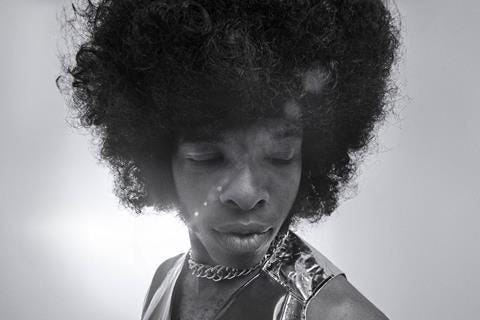'Sly Lives!' Review: Questlove Returns Celebrating More Music History
Whether you're a neophyte or an aficionado on Sly and the Family Stone this tells you something new
Director Amir “Questlove” Thompson returns to Sundance after his fantastic (and Oscar-winning) documentary Summer of Soul in 2021 with a documentary that’s both a musical celebration and a straightforward exploration of being a Black artist. Sly Lives! (aka the Burden of Black Genius) explores the titular Sly, of Sly and the Family Stone, in a way that doesn’t just break down the personal highs and lows but becomes a class in music making as well. Whether you’re a beginner to the band (like myself) or a long-time fan, Sly Lives! tells a familiar story while mining unique angles to get intimate.
Thompson starts the movie asking his talking heads about the concept of “Black genius.” What is it and how does it contribute to an artist’s rise and fall? As musician Andre 3000 explains, it’s not something quantifiable but “I love it when it happens.”
That’s the throughline of Sly Lives!, documenting Sly’s ability to know where the music was and, more importantly, where it was headed before anyone else. At the same time, as a Black man, Stewart was not just able to represent himself. He was required to represent the entirety of Black society, to always have a message, and to always be infallible. “We, as black folk, always have to be 3, 4, 5 steps ahead of everyone just to break even,” says musician D’Angelo at one point. That genius ended up causing Stewart to become so big as to enter into self-sabotage. "
There’s a similar energy found in Sly Lives! that was also in Summer of Soul: the frenetic, hard-hitting, fun impact that music provides. Joshua L. Pearson’s editing is able to skillfully blend musical performances in a fast pace that never makes the audience feel they’re being inundated with images, but it certainly conveys the fresh spirit of San Francisco in the 1960s. Sylvester “Sly” Stewart started his career as a popular radio DJ in San Francisco, but his ability to capture the musical zeitgeist at the time started early. Stewart received his first gold record at just 19 with a novelty dance song by Bobby Freeman. Stewart was one of the first to dabble in 1960s pop music, the rise of the British invasion, and psychedelia at the same time.
Yet the movie always weaves in the story of not just Sly’s genius as a musician, but how it dovetailed (and sometimes clashed) with his being a Black man. As Jerry Martini, the man Stewart credits as starting the band, explains: “I was a white man trying to be Black. He was a Black man being everything.” And Thompson shows what a burden that placed on everything, going back to Stewart’s parents coming to California as part of the Great Migration. The flopping of Sly and the Family Stone’s first album was chalked up to the band needing to dress nicer and play in better clubs and, more specifically, to cater to white audiences as well as Black.
It’s amazing to hear various musical artists break down the influences of the band’s music. There are influences you can still hear today in the work of Janet Jackson, Earth Wind and Fire and LL Cool J. At the same time, the need to please everyone was always a problem with the band. The irony of a song like “Everyday People,” which presents a utopia, is presented alongside the hippie movement which was predominately white while, at the same time, the Civil Rights Movement raged. Thompson and crew are so good at skillfully weaving in so many different threads and material to prove their point: Sly and the Family Stone wasn’t just a band, though it was. It also represented (and diverged) from everything happening during the time.
Of course, a music documentary like this can’t have the highs without the lows. “The same thing that makes you great is what kills you,” Andre 3000 says. Sly publicly struggled with addiction, which Thompson documents with a respect that doesn’t devolve into the tawdry. Though, as others say in the doc, Sly’s need to stay relevant as the musical culture passes him by did lead to all manner of embarrassing public appearances. In the grand scheme of things these moments aren’t as interesting as the musical exploration, though it is a necessary evil of stories like these.
Sly Lives! (aka the Burden of Black Genius) lives up to its title. It doesn’t have the same propulsive impact of Summer of Soul but it continues to showcase Thompson’s ability to weave a fabulous story that looks at different facets of music in a compelling way.





